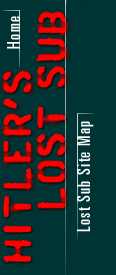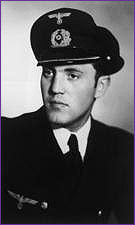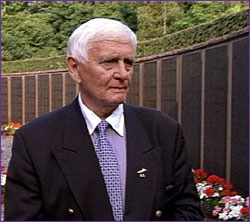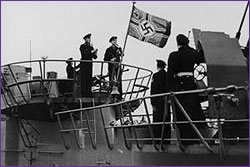
|

|
Sole Survivor Part 3 | Back to Part 2 NOVA: Does it make a difference that you now know where your comrades lie? Was it abstract before, where it is real now? Guschewski: Back then you thought the boat was at a depth of 4,000 meters (13,200 feet). That's how deep it is off Casablanca. Now it is only 70 meters (230 feet) down. I knew divers would go down there, and I just hope that the place where it was found and the remains of my comrades are being honored and respected and not made into a circus. I am very grateful to the divers who will take care that this place will be preserved and that only they know where it is. NOVA: Isn't 70 meters an unusual depth? Can a submarine be navigated in that?
NOVA: Back then, how did you find out that U-869 had sunk or didn't return? Guschewski: It was when the first books about the submarine war were published after the war that I read for the first time—I can't recall which book it was, there must be 20 by now—that U-869 sank on February 28, 1945, off Casablanca. Also known were the names of the attacking destroyers. It was said that the boat was in a depth of 4,000 meters (13,200 feet) and was destroyed. I knew back then that almost no more boats were coming home. Everybody knew that. NOVA: When the European war was over on May 8th, 1945, did you think about what may have become of your comrades? Guschewski: I survived U-602 and was stirred deeply by that, because I had had a great relationship with Commander [Philipp] Schüler, who wasn't really a superior but a friend to me. I was moved deeply. In the time after that I was in Flensburg in the School for Mates, and I had a chance to gain some distance. When I heard about U-869, it was also the end of the war, which meant a lot to me, the killing would finally stop. I had to accept the fact that U-869 had to still be sacrificed as well. After questioning Guschewski in a building near the U-boat monument at Möltenort, DeNooyer then interviewed him before the memorial itself. Survivors of the U-boat service erected the monument in memory of the 28,000 U-boat sailors killed in action during World War II. Beneath each U-boat number lie the inscribed names of all crew members lost. NOVA: What do you think of when you see this U-boat number and these names?
NOVA: If everything would have gone "normal," your name would be here. Guschewski: Yes, yes. And because I am already old, and my parents and siblings have passed away, nobody would find their way here to Möltenort. It is distressing to know all that. NOVA: What does it mean to you after 50 years, that all of this gets stirred up again? Is that difficult for you? Guschewski: On the contrary, it is a relief for me to be able to talk to friends about that. How it was back then, and why it all happened like it did. I feel sad inside but relieved to have lightened my burden. NOVA: Are you angry that all these young people, many of them very young, were sent to their deaths this close to the end of the war?
NOVA: And really you should have been among them. Guschewski: If I hadn't been so lucky I would now be immortalized here as well, and my skeleton would be in the wreckage off America, too. Of course, I am glad to have been able to live another 55 years, good years and bad years. I have children and a wife who takes care of me. I can be happy; all my comrades didn't have that. So I thank the Lord that I can stand here, even being myself on the verge of death because of my age. NOVA: Is that a burden for you that you are the surviving one? Guschewski: No, not at all. I don't think it is a burden. I see it as a mercy that I was allowed to live that long. I think that that is good and well, and I will pass my wisdom to my grandchildren and nephews so that they will live with my memories so that such a thing will never be repeated. Photos: (2,3,10) Courtesy Herbert Guschewski Collection; (4) Courtesy Martin Horenburg Collection; (5,7) John Chatterton; (6) Corbis Images; (8) Courtesy Helmut Neuerburg Collection. Tour U-869 | Sole Survivor | Hazards of Diving Deep 400 Years of Subs | Map of Lost U-Boats | Fire a Torpedo Resources | Transcript | Site Map | Hitler's Lost Sub Home Editor's Picks | Previous Sites | Join Us/E-mail | TV/Web Schedule About NOVA | Teachers | Site Map | Shop | Jobs | Search | To print PBS Online | NOVA Online | WGBH © | Updated November 2000 |


